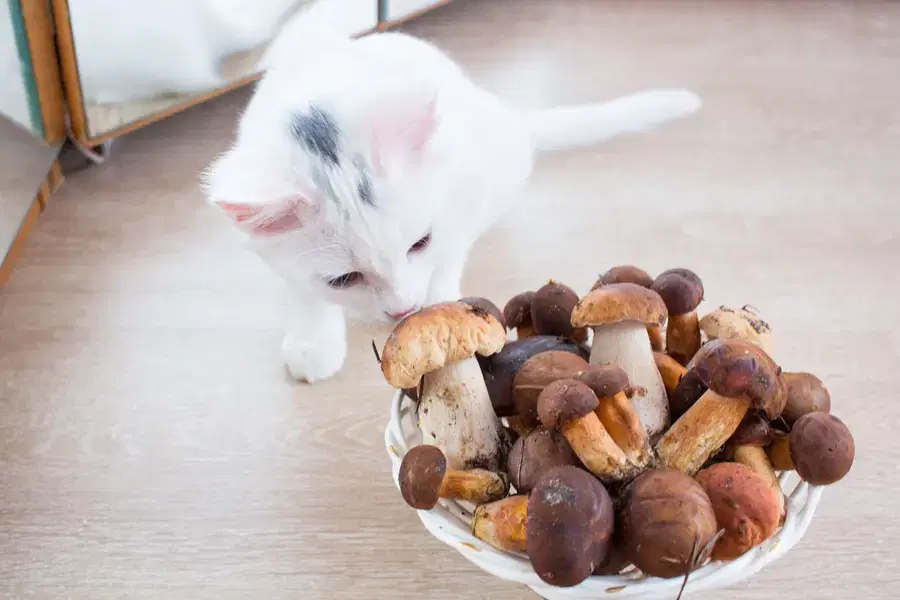Mushrooms and magic mushrooms have been in the limelight for a while now. They are not only used for their ‘magical’ properties but are a key ingredient in thousands of recipes across the globe. This proves that we humans enjoy mushrooms; their taste and ‘magic’. But do cats like mushrooms? And more importantly, can cats also feel the hallucinating properties of magic mushrooms?
Can Cats Eat Mushrooms?
The mushrooms that we commonly use for cooking are generally safe for your cat to eat. However, some terms and conditions apply here. So don't start sharing those mushrooms with your feline buddy just yet.
Do Cats Like Mushrooms?
While cats lack the taste buds that allow us to enjoy sweet things, they can pick up on savory flavors which could explain why we have seen many cats trying to get their paws on mushrooms at the dinner table. Mushrooms contain glutamate, a type of amino acid that gives it the umami flavor that cats may be attracted to. Additionally, cats are typically curious about what their humans are eating, especially if the texture looks interesting.
Are Mushrooms Good for Cats?
The answer is yes, but only store-bought ones. Wild mushrooms found in the forest can be poisonous for both you and your cat. Cats are carnivorous in nature, so the majority of their nutrition requirements should come from meat. But, mushrooms can still provide your cat with some good benefits for their health. Let’s break down the nutritional content of Mushrooms.
A serving of 100 grams of mushroom consists of the following –
Calories: 22kcal
Carbs: 4.3g
Fat – 0.1g
Protein: 2.5g
Calcium: 18mg
Iron: 0.4mg
Magnesium: 9mg
Potassium: 448mg
Sodium: 6mg
Zinc: 1.1mg
Vitamin B6: 0.11mg or 8%DV
Niacin: 3.8mg
Folate: 6%DV
Health Benefits of Mushrooms for Cats
There are multiple health benefits of mushrooms for your cat. The three big ones include:
Immune System Boost – Mushrooms contain beta-glucans which are soluble fibers that help fight infections and boost the ability to fight viruses.
Helps Reduce Inflammation – The fatty acids and vitamins in mushrooms have anti-inflammatory properties. These can help fight inflammatory bowel disease, arthritis, and bronchitis.
Helps Protect Against Cancer– Mushroom types like Shitake and Reishi assist the cat’s body to stay protected against cancer.
Not to forget all the water that these fungi have that helps keep the cat hydrated.
How Much Mushroom Should I Feed to My Cat?
While we know that mushrooms can be safe for your cat, there is a limit to how much mushroom you should be feeding your cat. The recommended quantity is no more than one or two pieces once a week. You need to make sure that mushrooms are just an occasional ‘good behavior’ treat and not a part of their daily diet. Your cat could face potential challenges if you end up feeding them too much mushroom.
How Can You Feed Mushroom to Your Cat?
Raw is safe. Cooked it safer – While it is safe for your cat to eat raw store-bought mushrooms, it is always advisable that you feed cooked mushrooms for better digestion.
Keep it Simple – Store-bought mushrooms are okay, but mushrooms on top of pizza are not. There is a chance that your cat might ingest garlic oil, pieces of onion, or other vegetables from the pizza or other foods that are not safe for them.
Tiny cubes – Do not feed your cat a whole mushroom. Make sure to cut it up into tiny pieces, and only give them a little at a time.
Which Mushrooms Are Okay For Your Cat to Eat and Which Are Not?
The following mushrooms are safe for your cat to eat.
White button
Shiitake
Portobello
Enoki
Oyster
Porcini
Morel
All of the mushrooms below are very poisonous to your cat. Make sure to keep these mushrooms away from your pet at all times.
Death cap
Fly agaric
Autumn skullcap
Jackson's slender amanita
Sickener
Deadly webcap
Death angel
Do Cats Feel the Magic of Mushrooms?
Cats can feel the hallucinogenic effects of magic mushrooms. If your cat does end up ingesting psilocybin mushrooms, you should be looking out for symptoms like hallucinations, tremors, sensitivity, vocalization, nausea, disorientation, and seizures. Contact your vet immediately if any of these occur.
My Cat Ate Too Much Mushroom. What Do I Do?
If your cat eats too much mushroom, they can suffer from mushroom toxicity. Keep an eye out for the following symptoms:
Vomiting
Diarrhea
Lethargy
In case your cat ends up eating wild mushrooms, look out for the following symptoms:
Mild to severe vomiting
Drooling
Extreme sensitivity to light and sound
Unsteady balance
Yellowing of the eyes and skin
How Spot Pet Insurance Can Help
Spot Pet Insurance offers customizable accident and illness and accident-only plans; customize your plan by choosing your deductible, annual limit, and reimbursement rate from a range of options. Spot plans offer up to 90% cash back on eligible veterinary bills, so you have help with peace of mind as you navigate the unexpected illness or injury of your pet. Spot plans help give pet parents the ability to focus on caring for their pet while worrying less about the cost of their care. Get a free quote today!
Conclusion
Mushrooms are safe for your cats to eat, given that they are store-bought and fall under the list of safe species of mushrooms for cats. However, they should not be a part of their daily diet, but just an occasional treat to be given in very small quantities once in a while. So, in case, you’re feeling the ‘magic’ of the mushrooms, keep them away from your cat.
Happy mood and health to your purry friend and lots of love and licks to you! (Licks by your cat).
The information presented in this article is for educational and informational purposes only and does not constitute or substitute for the advice of your veterinarian.
